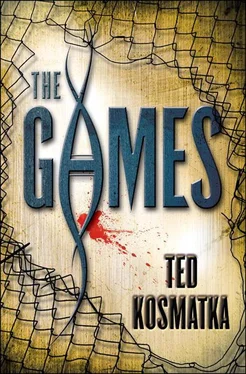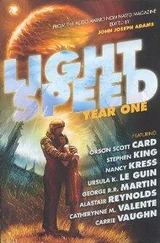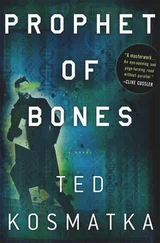Pea was the one. Pea was the one who knew all the secrets.
All Evan knew was that the world would soon be different.
Baskov would pay for what he’d done. Pea would have a plan.
Pea must have a plan.
Evan crouched in the darkness and waited.
The crowd .
Protesters congealed at street corners. Black asphalt, white concrete. Streetlights translated distance into discrete pools of illumination. The Olympic arena rose like a blister, glowing up at the night sky, circled by parking lots and low gray buildings. And circled beyond that by larger Phoenix itself, the city and its suburbs, and finally by the mountains .
Because it is necessary for a march to begin at a remove from its final destination, the crowd of protesters gathered here, on Seventh Avenue, some distance from the arena. Here traffic had stopped, a given-up thing. Cars were abandoned in the throng .
From above, the crowd appeared as a living organism, a single amoeboid mass, pseudopodia curling down city blocks, bunched into muscular potential .
Only at street level was the crowd’s multicellular nature manifested. Men and women in T-shirts and sandals and hats and backpacks—the new protester class. They were young, for the most part, this proletariat; they were educated and considered themselves enlightened and kind. They were turgid with righteousness. They had many solid and steadfast views about the world and their place in it—about science and religion, and about themselves—and they were going to disrupt this Games if they could .
Men in dark ties directed from the sidelines, gray bullhorns clutched in fisted hands. These men in ties also thought themselves enlightened, also thought themselves righteous, though they harbored few misapprehensions about their own kindness—and each of them, to a man, understood that the difference between a crowd and a mob was defined simply by the presence of a nervous system. And they were that nervous system .
Uniformed police watched it all from a distance, a safe some-blocks-off distance, positioned between the crowd and the arena, clutching riot shields. Phoenix was a clean city, a modern model of neatness and efficiency, and the police took comfort in the knowledge that there wouldn’t be much to throw if the crowd turned ugly. There were no rocks in the streets, no bricks, or cinder blocks, or chunks of wood. All the garbage cans and benches had been removed days ago. If the crowd was going to throw things, it would have to throw things it had brought .
Muffled in the distance, a cheer went up in the bright lights of the arena. The opening ceremonies. The Games were about to begin .
The men in dark ties lifted their bullhorns. Slogans were shouted, amplified .
In the distance, another voice rose as if in response—a commentator’s voice broadcast from a thousand speakers, booming from the arena walls, rising into the hot Phoenix darkness: “Welcome, everyone, to the gladiator competition of the thirty-eighth Olympic Games!”
In the street, the crowd convulsed and began to move .
The march on the arena had begun .
THERE WAS a knock on the door.
“Who is it?” Silas said.
“Open the door,” came Ben’s voice.
The door swung inward, and Ben stepped through.
“They’re starting,” Ben said.
“Then you’re going to be late,” Silas said.
“You mean we’re going to be late,” Ben said. “Hey, what the hell are you wearing?”
“I’m all about comfort tonight,” Silas answered.
Ben looked down at his own tuxedo, a pained expression on his face. “I’m that overdressed?”
Silas was wearing faded jeans and a white tee. Bare feet. “No.”
“You’re not going,” Ben said, realization dawning.
“Exactly.”
“You have to go.”
“No, I don’t.”
“You’re the program head.”
“I’m also persona non grata among the upper echelon of the commission, remember? Besides”—Silas flipped Ben’s collar up—“you make this look good.”
Ben smoothed the collar back down. Against the far wall of the hotel room, the holo-screen was quietly babbling the pre-show, handsome talking heads talking, point and counterpoint, men calling one another by their first names the way people never do in real conversation. Back to you, John. Thank you, Rick .
“I’ll have a better view from here, anyway,” Silas said, picking up the controller. He hit the button, and the image on the holo-screen changed, showing the arena from a different camera angle. He ran through several more before settling for a close-up of the battle floor. Ben could almost count the individual shavings of sawdust.
Just then Vidonia emerged from the bathroom. Ben looked her up and down. Slacks. Blouse. No dress. “You, too?” Ben said.
“Best seats in the house are right here.” She rubbed the foot of the bed.
“I can’t believe you guys are throwing me to the lions like this.”
“Go get ’em, Tarzan,” she said.
“Helix is proud of you,” Silas added.
The overzealous voice of a commentator broke in on the TV: “Welcome, everyone, to the gladiator competition of the thirty-eighth Olympic Games!”
“Better hurry,” Silas said. “It’s starting.”
“—OF THE thirty-eighth Olympic Games!”
Baskov tuned out the commentator’s voice and focused his attention on the people eddying within the skybox. They were men in suits, for the most part, with pretty women at their elbows. They were businessmen, moneyed men, politicians. Many he knew personally; others were strangers, but nearly all made a point of shaking his hand and congratulating the commission on bringing another gladiator program to fruition.
“It’s going to be quite a night,” he assured them. His hand was sore from it, his smile worn thin.
Still no Silas. He looked at his watch. Good . The doctor had apparently known enough to stay away. Having to deal with Silas would have been just another irritation he didn’t need.
Baskov turned back toward the glass to stave off further rounds of salutations and looked down to the floor of the arena a hundred and twenty feet below.
He touched the glass with his index finger, and the pane in front of him opaqued slightly. A holographic image of the pit zoomed toward him, magnified a dozen times. His eyes had a choice now. They could focus on the close-up image in the glass or through it to the actual fighting pit far below.
The crowd in the stands cheered as the commentator’s voice modulated upward. Baskov didn’t bother to understand the words being spoken; their meaning was clear. Two flags rose on opposite sides of the oval.
The matchup was decided by a complex system of ranking and lottery. The winner of the first round would advance into the second, and so on, and so on. A classic pyramidal elimination. He looked at the flags and saw Argentina and France would be first.
Icers stood at intervals around the periphery of the oval. Near the commentator booth, he saw the armed guard, light glinting off his chrome helmet. Baskov touched the dial of the two-way clipped inside his breast pocket. “Can you hear me?” he said softly.
The guard shifted, and his arm came up, touching the side of his helmet. “I can hear you,” said a voice from Baskov’s pocket. Too loud.
Baskov turned the knob. “Just stand there and look pretty. Don’t do anything unless I explicitly tell you. Do you understand?”
“Yes,” the voice came again, softer now.
“Do nothing.”
“Yes, I hear you.”
“Absolutely nothing.”
“Yes, I hear you.”
Читать дальше












